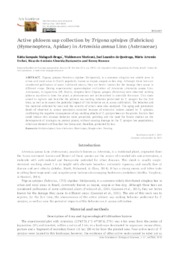Active phloem sap collection by Trigona spinipes (Fabricius) (Hymenoptera, Apidae) in Artemisia annua Linn (Asteraceae).
Active phloem sap collection by Trigona spinipes (Fabricius) (Hymenoptera, Apidae) in Artemisia annua Linn (Asteraceae).
Autoria: MALAGODI-BRAGA, K. S.; MORICONI, W.; QUEIROGA, J. L. de; URCHEI, M. A.; PAZIANOTTO, R. A. A.; RONCON, K.
Resumo: Abstract: Trigona spinipes Fabricius (Apidae: Meliponini), is a common stingless bee widely seen in urban and rural areas in Brazil, popularly known as irapuá, arapuá or bee-dog. Although these bees are considered pollinators of some cultivated plants, they are better known for the damage they cause in different crops. During experimental agroecological cultivation of Artemisia (Artemisia annua Linn, Asteraceae), in Jaguariúna (SP, Brazil), stingless bees Trigona spinipes (Fabricius) were observed sucking phloem sap directly from the plant, a phenomenon not yet described in scientific literature. This study aimed to register and describe the phloem sap-sucking behavior performed by T. spinipes for the first time, as well as to assess the potential impact of this behavior on A. annua cultivation. The behavior and the material collected by bees and the severity of attack were also analyzed. The aging and premature death of observed A. annua specimens occurred because of extensive lesions caused by T. spinipes, confirming the negative consequence of sap-sucking attacks of T. spinipes bees on the plants. Factors that could induce this unusual behavior were presented, pointing out the need for future studies on the development of strategies to protect plants, without causing damage to the T. spinipes bee populations, which are elements of Brazilian bee fauna and, therefore, protected by law.
Ano de publicação: 2019
Tipo de publicação: Artigo de periódico
Unidade: Embrapa Meio Ambiente
Observações
1 - Por padrão são exibidas publicações dos últimos 20 anos. Para encontrar publicações mais antigas, configure o filtro ano de publicação, colocando o ano a partir do qual você deseja encontrar publicações. O filtro está na coluna da esquerda na busca acima.
2 - Para ler algumas publicações da Embrapa (apenas as que estão em formato ePub), é necessário ter, no celular ou computador, um desses softwares gratuitos. Sistemas Android: Google Play Livros; IOS: iBooks; Windows e Linux: software Calibre.
Acesse outras publicações
Acesse a Base de Dados da Pesquisa Agropecuária (BDPA) para consultar o acervo completo das bibliotecas da Embrapa.

